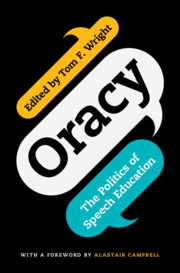Book contents
- Oracy
- Oracy
- Copyright page
- Contents
- Figures
- Tables
- Contributors
- Foreword: The Oracy That Democracy Needs
- Acknowledgements
- Introduction
- Part I Debating Oracy in the UK
- 1 Listening without Prejudice
- 2 Oracy and Social (In)Justice
- 3 Fluency for Me, But Not for Thee?
- 4 What is the relationship between oracy edcuation and confidence for students and teachers?
- 5 Lend Me Your Ears
- 6 Defending Oracy
- Part II Oracy in Global Context
- Part III Oracy in History and in Theory
- Index
- References
5 - Lend Me Your Ears
Listening at the Heart of Oracy
from Part I - Debating Oracy in the UK
Published online by Cambridge University Press: 23 September 2025
- Oracy
- Oracy
- Copyright page
- Contents
- Figures
- Tables
- Contributors
- Foreword: The Oracy That Democracy Needs
- Acknowledgements
- Introduction
- Part I Debating Oracy in the UK
- 1 Listening without Prejudice
- 2 Oracy and Social (In)Justice
- 3 Fluency for Me, But Not for Thee?
- 4 What is the relationship between oracy edcuation and confidence for students and teachers?
- 5 Lend Me Your Ears
- 6 Defending Oracy
- Part II Oracy in Global Context
- Part III Oracy in History and in Theory
- Index
- References
Summary
In this chapter, Debbie Newman, CEO of the education charity the Noisy Classroom, highlights the often overlooked role of listening in oracy. Despite oracy frameworks’ focus on speaking, listening remains undervalued. Drawing from experiences throughout her career, Newman underscores varied talk cultures among schools, from concerns about articulation to speaking reluctance. Arguing for a balanced approach, she stresses listening’s importance alongside speaking in academic, social, and professional contexts. To her this does not mean superficial "listening behaviours" but instead the broader understanding of listening as a cognitive skill. Newman explores how schools cultivate listening, citing examples from Modern Foreign Languages and drama departments, as well as through debate and discussion techniques. By championing listening skills, Newman contends, schools can enhance students’ abilities, fostering empathy and critical thinking for success in academic and real-world settings.
Information
- Type
- Chapter
- Information
- OracyThe Politics of Speech Education, pp. 66 - 76Publisher: Cambridge University PressPrint publication year: 2025
References
Accessibility standard: WCAG 2.2 AAA
Content Navigation
Allows you to navigate directly to chapters, sections, or non‐text items through a linked table of contents, reducing the need for extensive scrolling.
Provides an interactive index, letting you go straight to where a term or subject appears in the text without manual searching.
Reading Order & Textual Equivalents
You will encounter all content (including footnotes, captions, etc.) in a clear, sequential flow, making it easier to follow with assistive tools like screen readers.
You get concise descriptions (for images, charts, or media clips), ensuring you do not miss crucial information when visual or audio elements are not accessible.
You get more than just short alt text: you have comprehensive text equivalents, transcripts, captions, or audio descriptions for substantial non‐text content, which is especially helpful for complex visuals or multimedia.
Visual Accessibility
You will still understand key ideas or prompts without relying solely on colour, which is especially helpful if you have colour vision deficiencies.
You benefit from high‐contrast text, which improves legibility if you have low vision or if you are reading in less‐than‐ideal lighting conditions.
